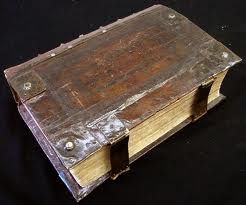With his Plymouth Brethren upbringing, Aleister Crowley was, in his own words, “deprived of all English literature but the Bible during the whole of his youth.” Crowley later bragged that even as a child he had developed the ability to find nearly any verse in the Bible quickly without the aid of a concordance and retained that ability as an adult. The Bible is the literary infrastructure of Crowley’s thought. In Liber 888 Crowley claimed “an intimate knowledge of the Bible so deeply rooted that it seems hardly unfair to say that it formed the whole foundation of my mind.” Crowley’s background among the Bible- obsessed Plymouth Brethren may have equipped him with a grasp of the Bible text exceeding that of any “Christian” occultist before him. There is ample evidence that he applied that grasp in creating his systems of magick and philosophy which are sprinkled liberally with quotes, paraphrases and other references to the King James Bible.
In the last 100 years, Biblical scholarship and philology have made steady advances in reaching an accurate sense of what the authors of the Tanakh and “New Testament” were trying to convey and multiple alternate translations of both works have been produced. The big new in Biblical translation of course is Robert Alter’s translation The Hebrew Bible: A Translation With Commentary. One of the key features of Alter’s work is to confront the translation that stems from specifically Christian theology, distorting the original meaning attended. Potentially, at least some of Crowley’s doctrines, incantations, magical formulae that were based on Christianized passages of the Tanakh could be revised to reflect the original text. Things could work better! They could work worse — as the King James lines had several centuries to build up their own magical charge via use in licit and illicit ritual work! Have fun experimenting!
And if you’d like to get an idea of the liberties the KJV might have taken with the source text, check out this review of Alter’s translation at The New Yorker.
https://www.newyorker.com/magazine/2019/01/28/how-to-read-the-good-books.



A given work is interpreted in a given way by a given people in a given place at a given time.
Since Thelema is based on late 19th century Plymouth Brethrten interpretations, then it is the correct interpretation for Thelemites living today in the 21st century.
that’s certainly one reasonable stance
Do what thou wilt shall be the whole of the Law.
Every translation of the Christian Bible (Hebrew and Greek, OT and NT) used by Christians in the history of Christianity have been translations ruled by theology and not linguistics/philology etc! There have always been “wars” going on regarding these translations among Christian fractions/Churches.
THELEMA is NOT founded or “based” on anything else than the Equinox of the Gods of March 1904 E.V. and The Book of the LAW of April 8, 9, & 10, 1904 E.V.!!!!
Love is the law, love under will.
Lechertier Barbe JR
Dear Lechertier
93
Notwithstanding — we have the Beast’s own comments on the influence of the King James and Darby Bibles, several of his A.’.A.’. mottoes which also reference Bible passages and other quotes and paraphrases you encounter in his work. So you can disregard them or take them into account as ye please. Thou hast no right but to do thy will.
93
93/93
Frater Lux Ad Mundi
Dear Frater Lux Ad Mundi
Do what thou wilt shall be the whole of the Law.
Thank you for your reply. Crowley’s use of various mottoes and translations are history now. Just as the translations used by the Gnostic and which not pleased the Church Fathers are history. Also, the Church Fathers’s adding of the doctrine of the Trinity not found in the oldest Greek MSS. of the New Testament but added later by them after a vote is history! They changed the words of the Holy Scripture owing to theology and power. As to changes of the words in the Hebrew and Greek original versions of the Bible, the official Latin version of the Bible used by the Roman Catholic Church, the Vulgate, was done by St. Jerome in the 4th Century AD and here he stated in his preface: “First read, then, my Samuel and Kings; mine, I say, mine. For whatever by diligent translation and by anxious emendation we have learnt and made our own, is ours.” – he changed many things!
It is fine to give new translations of bible passages given by Crowley in his works in footnotes in new editions of these works, but never change his original text! Remember also that the new biblical translations published today also have to choose between several meanings and translations of a word in Hebrew and Greek! A translation always reflects its translator and his opinions and faith (if he belongs to a Christian church). Luckily for us The Book of the Law is written in the language that it is written in, namely English, and no-one has the right or power to chance anything in the MS. or in Liber CCXX, but Liber CCXX can be translated into other tongues and here the faith and the abilities of the translator are keywords – the best is to learn English and read the original published by its prophet in his lifetime.
Love is the law, love under will.
Lechertier
Dear Lechertier
93
I made no suggestion that any Crowley written or received text should be amended. I was proposing as an experiment that one could consider how differing translations of Biblical text could affect their usage in sundry rituals and try amended rituals and take note of any differences in result.
93
93/93
Frater Lux Ad Mundi